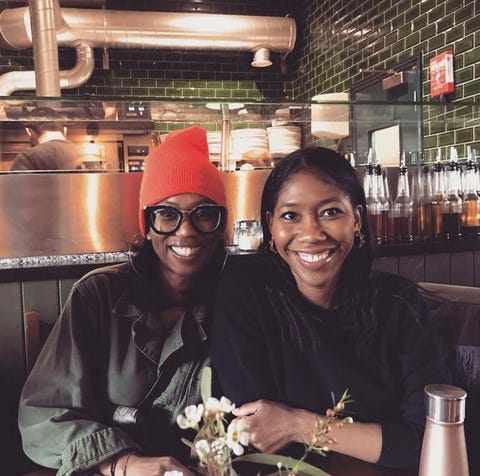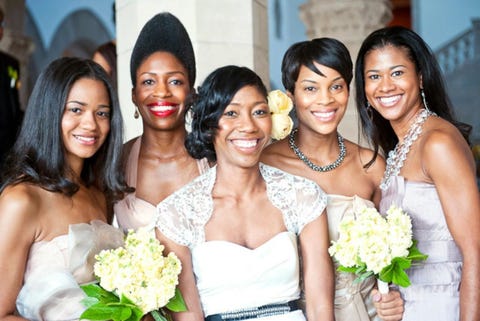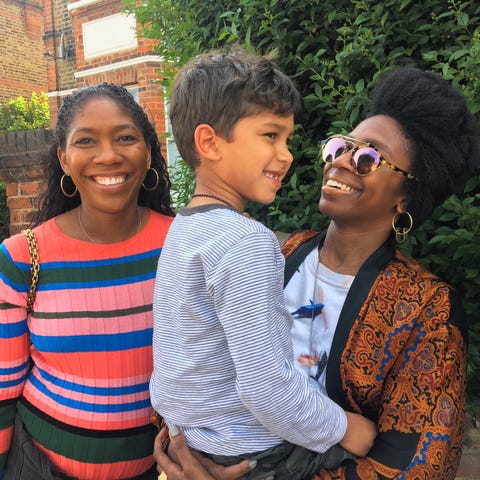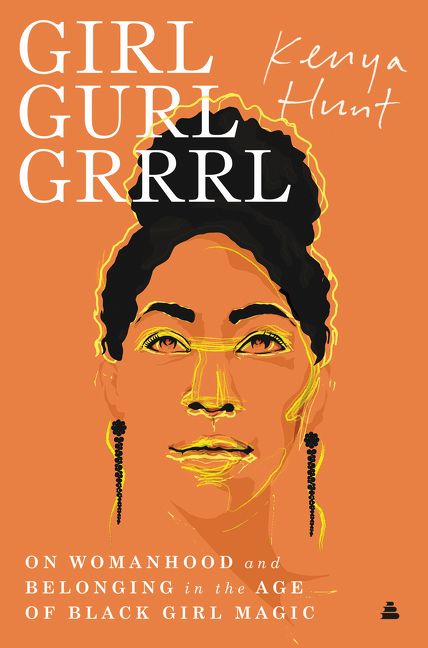Girl! GWORL. Gorl. Guhl. Gurl. Grrrrrlll.
“Mommy, why is it that every time you’re on the phone or with your friends, it’s always girl, girl, girl, girl?” my son asked me
as I was tucking him into bed. I was amused. Mostly at the sight and sound of myself through my five-year-old’s eyes and ears—he had gotten my animated pacing and high-pitched intonation just right—but also at the idea that I used the word enough for him to pick up on it.
“I hadn’t realized, sweets. Do I really say it that much?”
“Girl! You do,” he said with a childish smirk, before turning over and closing his eyes. I tried to swallow my laughter as I turned off the light and tiptoed out of the room. In my life I’ve used many pet names for the people I know and love: sis, luv, beauty, lovebug, babes, hon, pumpkin, doodlebug, sweets, bae, dumpling, and peanut, among others. But throughout my evolving networks of friends—and especially so among my Black chosen sisters—one term of endearment remains: girl. Equal parts greeting, exclamation, and rallying cry.
As long as I can remember, girl was the root word in the unique love language between Black women, regardless of age. “Girl, you got it. Just go out there and do your best,” my mom, Precious, would say while giving me a pre-dance recital pep talk. “Babygirl, you crazy,” my aunt Gloria, all gregarious joy, would tell my little sister, April, scooping her up in a hug upon discovering the child had piled on her hairpieces, blouses, and bangles in a game of dress-up.
“Hey, girl, hey,” my dorm mate at university would say in a conspiratorial hushed voice, unveiling a box of caffeinated soft drinks and Krispy Kreme doughnuts as we prepared to pull an all-nighter for one exam or another. “Guuurl,” my friends and I would sing along to Destiny’s Child’s “Girl” as we got dressed for a night out, placing extra emphasis on the vocal runs every time Beyoncé, Michelle, and Kelly would hit the title word. Girl was a one-word lingua franca that transcended class, generations, and geography. A word we used with each other to show affection and acknowledge shared history, experiences, and aspirations.

When I entered the working world, I became conflicted about the colloquialism. I was steeped in feminist culture as an assistant editor at Jane. Girl was a polarizing word. Some viewed it as an infantilizing condescension (that’s “womyn,” please, and thank you), others as an empowering subversion (hey, riot grrrls.)
And then there was the hipster racism I’d inevitably encounter at dive bars after work. Bearded white boys in flannel shirts telling me, “You go, girl,” an annoying mimicry of an old, equally annoying imitation of Black women comedian Martin Lawrence popularized years before. Or young white gay men on the fashion party circuit who mistakenly thought their queerness excluded them from buying into cultural stereotypes, who caused me to stiffen with their awkward greeting: “Hey, girl, I like your hair. Is it yours?”
I didn’t recognize myself in any of the pantomimes, though this was clearly how many envisioned Black women: one neck-rolling monolith. I refused to play to type and fit a narrow idea of what Black women were supposed to be.
I felt more kinship with the plethora of “girls” in the Black and brown ballroom scene. The icons in Paris Is Burning popularized the now-commonplace social media-age lexicon that includes ‘yassss, girl,’ ‘read,’ and ‘honey.’ These expressions—innocuous, everyday words given entirely new meanings—originated with us, Black women (cis and trans), and can be traced back through generations to our hair salons, kitchens, and churches. So I’d code-switch, limiting the love language to conversations with my closest Black women friends and family members back home.
I didn’t quite realize the Americanness of this, though, until I moved to London from New York in late 2008. I felt the need to build up my own network of Black women friends after tiring of always being the Only in my work and social life; I befriended Ghanaian, Nigerian, Jamaican, and Black British women with sharp opinions, bold voices, and thriving careers. Women who didn’t dot their anecdotes with a loud ‘girl’ for emphasis or use it as an affectionate preface to a warm hug or effusive compliment. So it dropped out of my daily lexicon, only coming out for occasional phone marathon catch-ups with stateside girlfriends.
"I refused to play to type and fit a narrow idea of what Black women were supposed to be."
But as a new wave of racial discourse and Black consciousness rolled in with the Obama administration in the late aughts, ‘girl’ took on a new life of its own, crossed the pond, and worked its way through the entire diaspora. We became, in a word, magic.
Like most cultural touchpoints in the 2010s, it began with a tweet. The hashtag #BlackGirlsAreMagic was created by one CaShawn Thompson to counteract tired stereotypes and lies. No, of course we’re not shrill, unmarriageable, ugly, and uneducated. We are strong, beautiful originators of movements and culture the world over. As I write this, I’m listening to the official #BlackGirlMagic playlist on Spotify, filled with music by women of color from across the world. There are Black Girl Magic T-shirts and books and book clubs and websites. Not that we needed the hashtag to tell us who we are—we don’t need a hashtag as validation. But the shortened #BlackGirlMagic and the like, including #BlackGirlJoy and #CarefreeBlackGirl, took off, broadcasting to the world what we already knew: When it comes to excellence, we’re not new to this (to quote Drake, vocal appreciator of Black women). We’re true to this.
I get my highs from the hit of underestimation. Give me a “meh” and I’ll make you eat it. Disregard me and I’ll show you. I get a rise out of proving people wrong. During the many interviews I’ve given as a fashion editor about the lack of diversity in the business, people sometimes ask me, “What does it feel like to make it in an industry filled with people who don’t look like you?”
It’s being 19 and told by a professor to manage your expectations and try a teaching career when you express a desire to work in magazine publishing. It’s an editor dismissing your pitch about a story on teenage moms with the wholly inaccurate logic that it “was no good because the story would just be about Black girls, and no one wants to read that.” It’s being repeatedly asked to go on television to comment only about why there are so few of you in media, television, and fashion, as if it’s the only subject you’re qualified to speak about.

It’s being seated next to a model agency owner at a work dinner who tells you you’re pronouncing your name wrong. “I know the most luxurious lodge in Keenya. Where do you like to stay when you’re there? Surely you’ve been to the country before, no? Not even Nairobi? Then why did your parents name you Keenya? You pronounce it ‘Ken-ya,’ you say? Not ‘Keenya’? Hmmmm, are you sure?”
It’s trying to restrain yourself from using the other kind of girl—“Girl!”—as admonishment and verbal eye roll. The kind of girl I use for women who test my patience, no matter what their race. As in, “Girl, stop! Old white colonialists pronounce it that way.” It’s sitting in a staff meeting and suggesting a Black pop star for the cover, only to be told, “But we just had a Black woman on the cover last month. And it would be too weird to have two in a row.”
But that was then. And this is now, the age of Black Girl Magic, in which we’re owning the expansiveness of Blackness at its cross-section with womanhood, tracing its myriad shapes and textures, during a time when what it means to be a Black woman has permeated every level of public discourse, from the unbelievably tragic (Sandra Bland, Breonna Taylor, Atatiana Jefferson, and a tragically long list of others) to the tragicomic (Rachel Dolezal).
What is Black Girl Magic? It’s Solange Knowles dressed in white, dancing on the streets of New Orleans. It’s Malia and Sasha Obama, with girlfriends, in my favorite photo of them, trailing behind their dad, the first Black president of the United States, as they deplane Air Force One. It’s Black Lives Matter founders Patrisse Cullors, Alicia Garza, and Opal Tometi, galvanizing a global movement against the brutalization of Black bodies. And Bernardine Evaristo winning the Booker Prize, the first Black British author to do so. It’s a video clip of Michelle Obama congratulating Beyoncé on her record-breaking Netflix special, Homecoming, a rich, rousing, and very Black tribute to historically Black universities. It’s nineteen Black women being elected to judgeships in Texas. And five Black women, their backgrounds spanning South Africa, Jamaica, and the U.S., winning the world’s five most iconic beauty pageants: Miss America, Miss USA, Miss Teen USA, Miss World, and Miss Universe. It’s Black actresses, singers, and models dominating U.K. and U.S. women’s magazine September 2018 issues for the first time in history. And South African two-time Olympic 800-meter champion runner Caster Semenya declaring herself “supernatural” as she sought to qualify for the Tokyo Olympics. It’s Kamala Harris running for president. And all of us avowing our solidarity in the face of global pandemics and tragedy. Women, girls, daring to be true to the gradations of ourselves in a world where anyone not named Beyoncé, Rihanna, or Lupita tends to get depicted as chronically angry, perennially overlooked, forever victimized, unfailingly ratchet, and more. That’s not how I view myself. That’s not how anyone I know views themselves.

The world expects the more familiar, stereotypical image of us as the server of side-eyes and roller of necks. But Black Girl Magic is a celebration that frees us from the confines of narrow expectation or subtext.
Girl!
In a way, the word had become a positive affirmation and a vocal show of unity in our age of outrage. Yet little is written about using it in this way.
I’ve watched girl come full circle, just as my relationship with it has. I now openly use it to show sisterly affection, shared cultural experiences, or not—as do many Londoners I know. At a women’s festival at the Saatchi Gallery, where I appeared as a speaker, the green room was a joyous din of loud laughter, chatty group hugs, and enthusiastic “hey girls” between authors, journalists, models, activists, and athletes. Onstage, I asked Halima Aden, the Kenyan-born Somali American who made history as the world’s first hijab-wearing supermodel, if she ever felt a weight of responsibility as a First. “Well, girl, when you put it that way,” she laughed before admitting she does.
Here, girl wasn’t tied to any specific country of origin. Just as it wasn’t during the London Women’s March months later, where protestors of all ethnicities and ages walked with placards featuring such ballsy, unforgettable messages as “Girls just want to have fun-damental human rights” and “Girls doing whatever the fuck they want.”
Girls! Girl. Gurl. Girl, hey. Girl, bye. Girl, stop. Girl, go. Girl, we see you, and feel seen.
Adapted excerpt from Girl Gurl Grrrl: On Womanhood and Belonging in the Age of Black Girl Magicby Kenya Hunt. Reprinted with the permission of Amistad, an imprint of HarperCollins. Copyright © 2020 by Kenya Hunt.

